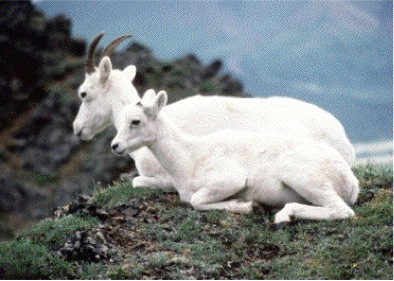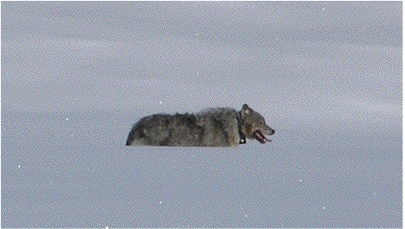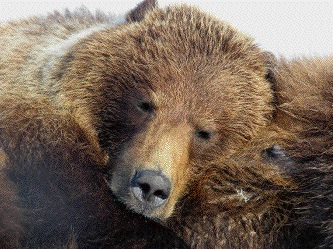Dall sheep (Ovis dalli
dalli, Divii in Gwich’in) in the Richardson Mountains
are isolated at the northeastern limit of the species
range. Aerial surveys have indicated that the population is
declining since the mid-1990s and suffers from low
recruitment rates. The fluctuations of this relatively
small population (currently estimated at 700 individuals)
may be shaped by a combination of factors, including
overgrazing, harsh weather, harvest, diseases, and
predation. Efforts to evaluate the status of the range and
the condition of the herd were undertaken in recent years
(Auriat 2005, Kutz et al. 2004.), and harvest monitoring is
now being addressed through a developing management plan.
Predation, on the other hand, has received limited
attention so far, despite the fact that predators are
frequently mentioned as potential culprits for the Dall
sheep decline during community consultations. Grizzly bears
(Ursus arctos, Shih) and wolves (Canis
lupus, Zhoh) are common in the Richardson Mountains,
and are both susceptible to prey on this Dall sheep
population.

Research in Alaska identified grizzly bears as the main
predator of caribou calves (Adams et al. 1995), and their
potent role as an ungulate predator seems to be more
important during the first few weeks of life (Zager and
Beecham 2006). Similarly, they could be a limiting factor
for Dall sheep, particularly for the lamb segment of the
population. The productivity of grizzly bear females in the
Richardson Mountains was studied from 1992 to 2000
(Branigan 2000). However, very little is known about the
current status of the population, habitat use, nutritional
ecology, and impact on this sheep population, if any.

Wolves have been reported as a significant limiting factor
of mountain sheep populations (Mech et al. 1985, Murie
1944, Sawyer and Lindzey 2002, Sumanik 1987). Arctic wolves
also rely on other ungulates, such as caribou and moose,
and some packs follow barren-ground caribou herds in their
migratory paths (Walton et al. 2001). In the northern
Richardson Mountains and the Yukon North Slope, wolves seem
to depend mostly on moose and, seasonally, on the Porcupine
Caribou herd (Hayes et al. 1997, 2000). The extent to which
wolves prey on Dall sheep is unclear. Wolf packs
surrounding the Dall sheep range area benefit from
year-round prey sources, such as sheep, moose, and smaller
mammals, and may not be following the caribou migrations as
much as other wolves. Understanding the wolves’ spatial and
predation patterns is an important step to assess their
impact on Dall sheep in the Richardson
Mountains.